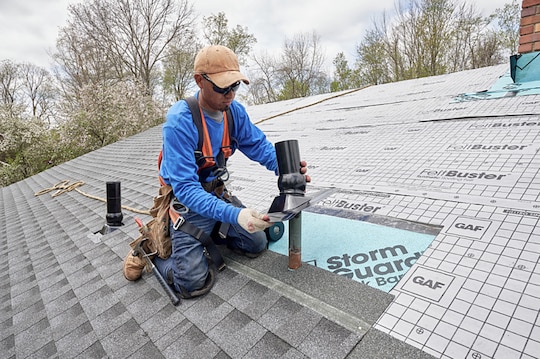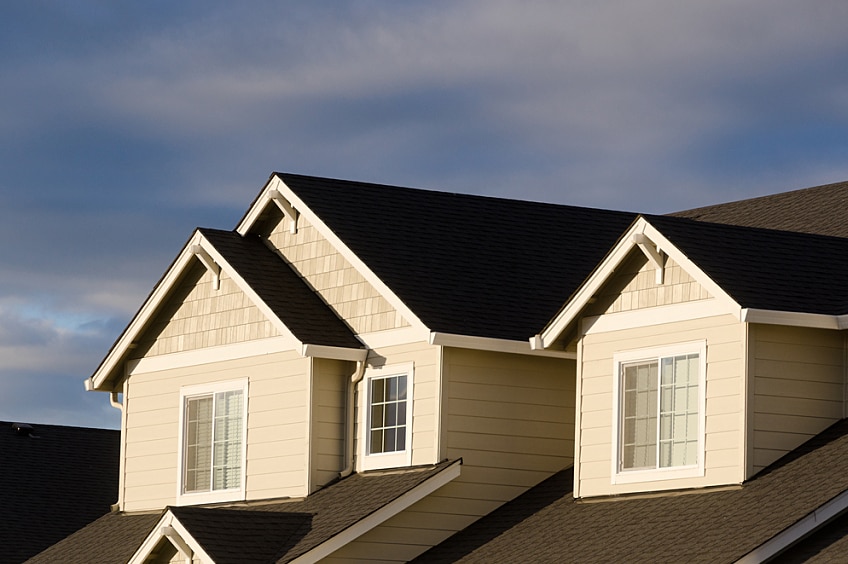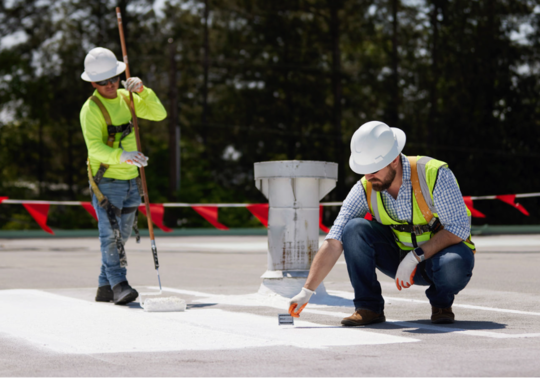
Does your roof have a slope that allows rain and melting snow to drain into gutters or off the eaves? If so, you likely have a gable roof.
While there is a wide range of roof designs, a gable roof is one of the most popular roof types, especially because of their ability to balance aesthetics and utility. Let's take a closer look at what this roof type entails.
What Is a Gable Roof?
This type of roof features two peaked sides that meet at a ridge line. The two sloping sides create end walls to form an "A" shape—a triangular extension called a gable—at the top on each end of the house. Traditionally seen in ranch-style or Cape Cod homes, gable-style roofing systems shed water well, making them one of the most popular options across North America.
How Does a Gable Roof Compare to a Hip Roof?
Both hip roofs and gable roofs are popular choices for residential homes, but they're quite different. Hip roofs slope back from all four roof sides down toward the walls of the home, which sit under the eaves. A hip roof has no vertical ends, and the "hip" is actually the angle formed where two sides meet.
With gable roofs, on the other hand, only two sides slope downward. The other two sides extend from the bottom of the eaves toward the peak of the ridge line.
What Are the Benefits of a Gable Roof?
Gable roofs provide versatility and durability that work with many styles of homes, making them a cost-effective and smart choice in most parts of the country. Because they have a simple design and their framing doesn't need to be constructed onsite, gable roofs are typically easier to install, and therefore more affordable than hip roofs. Gabled roofs also allow for more ventilation, giving homeowners more available space underneath the roof for features such as vaulted ceilings and attic space.
These types of roofs work well to shed water and snow thanks to their steep pitch, making them excellent choices for homeowners who live in areas that receive heavy snowfall. Gabled roofs also tend to provide good water drainage. The GAF lifetime roofing system is a great roofing system for your gable style roof. When you install a GAF Lifetime Shingle and at least three qualifying GAF Accessories, you get a Lifetime Limited Warranty on your qualifying GAF products.*
What Styles Do Gable Roofs Come In?
Some builders combine both hip roofs and gable roof types. What is a gable roof doing alongside elements of a hip roof? The end result often creates a more interesting design. For instance, a Dutch gable roof is a hip roof with a small gabled section on the upper section. Another variation is a half-hip roof, which adds a small hip section sloping toward the ridge onto a gable roof. Bringing elements of both types of roofs together can result in beautiful designs that offer better overall curb appeal.
There are many types of gable roofs. Most have equal-sized roof decks extending to the side walls of the house and sometimes beyond them.
- Cross-Gabled: If a home's floor plan requires a T-shaped house, the roof is cross-gabled, where two gable roof lines meet at a 90-degree angle. Houses that have garages, dormers, porches, or additions also use a cross-gable roof structure.
- Side-Gabled: Gabled roofs that show their slanting side on the front of the home are called side-gabled, while those where you see the pointed wall are called front-gabled.
- Open Gable: An open gable (or pyramid roof) consists of a hip roof on a square structure. Here, the sides all join up to form a single peak. A box gable roof features two different slopes, where the lower angle is much steeper than the higher one.
- Gambrel: Another type of gabled roof called a gambrel, or barn-style roof, features a multi-sided hip roof with two sloped sections—one flat part close to the ridge and one close to the eaves that features a sharper drop. These roofs allow for the maximum amount of usable space under the roof.
- Flying Gable Roof: A flying gable roof has a ridge overhang that extends out farther than the eave to form a point at the end of the ridge. A front gable roof is usually seen on Colonial-style homes and is placed at the front to highlight the entrance and add coverage to the porch or entryway.
What kind of gable roof does your home have? Does it provide a way to keep your home secure and boost your curbside appeal? For more inspiration, browse the GAF style guide.
*See GAF Roofing System Limited Warranty for complete coverage and restrictions. Lifetime refers to the length of warranty coverage provided and means as long as the original individual owner(s) of a single-family detached residence [or eligible second owner(s)] owns the property where the qualifying GAF products are installed. For other owners/structures, Lifetime coverage is not applicable. Visit gaf.com/LRS for qualifying GAF products. For installations not eligible for the GAF Roofing System Limited Warranty, see the GAF Shingle & Accessory Limited Warranty.


